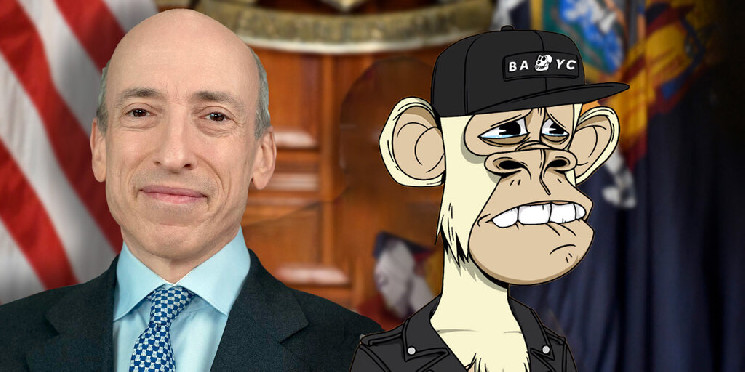On Monday, the U.S. Securities and Exchange Commission (SEC) announced its first-ever enforcement action related to the sale of NFTs, fining a Los Angeles-based media company $6 million for selling illegally unregistered securities. But does this action signal an imminent crackdown on a wider range of NFT projects?
The facts of the case were not exactly ambiguous: the fined company, Impact Theory, told prospective NFT buyers that “if you [ETH]you get a huge amount more than that” once the company became “the next Disney”.
Monday’s news, however, leaves many doubts about the fate of the multibillion-dollar NFT industry, which until this week had avoided the wrath of the SEC. crypto-allergic chairman, Gary Gensler.
Following a pattern now typical of crypto-related cases, the SEC’s announcement on Monday was quickly followed by a vocal punishment of the five-seat Republican minority Commission. SEC Commissioners Hester Peirce and Mark Uyeda slammed their chairman for trying to gain dominion over the NFT market, which consists largely of digital collectibles and works of art.
“We do not routinely take enforcement action against people selling watches, paintings or collectibles along with vague promises to build the brand and thus increase the resale value of those tangible items,” Pierre and Uyeda wrote in their dissenting opinion.
The SEC has never regulated the art market or luxury goods trading. But could the Commission’s current antipathy towards crypto-related products prompt it to start regulating the sale of NFT-backed art projects, digital collectibles and membership cards? Was Monday’s action the shutdown of a run-of-the-mill securities program that just happened to feature NFTs, or a calculated signal that the SEC is coming for the entire NFT market?
Jeremy S. Goldman, a litigation attorney specializing in the regulation of NFTs and blockchain technology, found the SEC’s enforcement action this week not inconsistent with any form of Rubicon. Such a line would However, according to the attorney, this would be crucified if the SEC took the opportunity to go after more mainstream NFT projects.
“Many of these projects just sell art. They sell collectibles,” Goldman said Decrypt. “If they take action against these projects, I’ll be surprised — if they decide to open Pandora’s box.”
Such issues include delving into more obscure legal (and philosophical) questions, namely how to measure profit expectations against more abstract factors, including the enjoyment of art and the enjoyment that comes from collecting rare objects. Plus, if the SEC goes after NFT art and collectibles, won’t it have to regulate every art fair and Beanie Babies convention in the country?
“The SEC doesn’t want to get involved in the art market,” said Brian Frye, a law professor at the University of Kentucky who specializes in art and NFTs. Decrypt. “As a result, I see no chance of the SEC regulating the NFT art market.”
But to ask another philosophical question: what is art? Some of the top brands in the NFT industry don’t come from individual artists, but from billion dollar companies who sell profile picture projects (PFP) of 10,000 units that are best known for their extraordinary resale value.
“A project like the Bored Ape Yacht Club,” said Frye, “essentially sells 10,000 shares for a fixed price, then floats them and takes a commission on trades. That is very similar to a company that does an IPO and then acts as a broker.”
Whether the SEC decides it can go after major PFP projects without appearing to encroach on the art world will be a delicate calculation; several such NFTs have already been seen in some of the worlds most prominent art museums And Auction houses.
But the agency has also proven, at least in the crypto world, about a voracious rule They aim to control entire markets, more than just penalizing sporadic bad apples.
One possible indication of the SEC’s future plans for the NFT market was hidden in the cease and desist order that the agency released on Impact Theory on Monday. To back up its claim that the media company’s NFTs were, in fact, unregistered securities, the SEC highlighted the fact that Impact Theory collects a 10% maker’s royalty on every resale of its “Founder’s Key” NFTs.
“Since the issuer receives a certain amount of value each time one of these NFTs trades, that could be a suggestion that they promote liquidity,” said Drew Hinkes, an attorney and adjunct professor at NYU specializing in digital assets. Decrypt.
So the SEC could have just established a crucial relationship between the makers’ royalties and the securitized assets. If such an association currently influences SEC decision-making, the vast majority of the mainstream NFT market would, in the eyes of the agency, fall within its oversight jurisdiction. Most popular NFT collections are currently charging maker fees or finding ways to do so given recent industry-wide developments.
Over the past few months, maker royalties — fees typically ranging from 2.5% to 10% applied to the secondary sale of NFTs and paid out to makers — have come under increasing threat, as some NFT marketplaces have . withdrawn from guaranteeing it.
NFT industry leaders have condemned such moves, arguing that creator royalties are fundamental to the essence of NFTs and for the purpose of the industry. Several leading companies, including Yuga Labs – owner of the Bored Ape Yacht Club and CryptoPunks – have announced their intention to only sell NFTs on platforms that guarantee maker fees.
These companies may ultimately win the ongoing battle with trading platforms over creator royalties. But that victory could end up being a pyrrhic victory, bringing greater risk in the looming war over industry-wide regulation.

